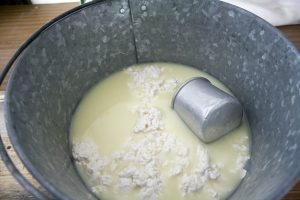Whey is widely considered the best source of supplemental protein for resistance training.

A by-product of cheese production, whey protein is the most popular protein supplement on the market. It is mainly utilized to:
- Promote muscle growth & recovery. Whey is regarded as the best pre or post-workout supplemental protein source.
Overview
Whey is the liquid material left over when milk is coagulated during cheese production. This solution is composed of 5% lactose in water as well as various proteins and minerals. Although it was originally considered a waste byproduct, whey has surged in popularity in recent years because of its high protein content. This protein is isolated and used to make protein powder supplements.
Whey protein is incredibly popular among bodybuilders and other strength athletes, especially after a workout when muscles require a quick source of amino acids to begin the repair process. Whey’s popularity is tied to three main properties:
- It contains all nine essential amino acids (building blocks of protein) in high concentrations, making it a ‘complete’ protein source
- It has the highest amount of leucine of any protein source (about 14%), the only amino acid known to directly stimulate muscle protein synthesis (MPS)
- It is absorbed very effectively, and results in the highest acute (up to 3 hours after consumption) increase in muscle protein synthesis of any protein source

How Whey Might Help Post Workout Formulas
Promoting muscle growth and recovery
Strenuous exercise and resistance training in particular are known to damage muscle tissue, and also increase the rates of both muscle protein breakdown (MPB) and muscle protein synthesis (MPS). The balance between these two processes is what determines whether muscle is gained or lost. However, this balance still remains negative unless sufficient amino acids are provided.
As such, the main role of whey protein is to provide the body with a source of amino acids to stimulate MPS and result in a positive protein balance, meaning that muscle mass is gained rather than maintained or lost. 1
Whey’s Post Workout Benefits & Uses
Whey protein is most commonly used immediately after resistance training to help the body repair muscle tissue and stimulate muscle growth. While any protein source can be used pre or post-workout, whey is widely considered to be the most effective option because it contains high concentrations of essential amino acids, including high levels of BCAAs and the highest levels of leucine, the only amino acid capable of directly stimulating MPS and potentially decreasing MPB.
In addition, whey is also preferred as a post-workout in particular because it is absorbed very quickly and effectively, and has been shown to result in the highest short-term spike in MPS of any protein source.

Research
Human Research
Whey protein has been shown to be capable of increasing muscle mass in numerous clinical trials. However, there is not yet enough evidence to suggest that it builds muscle more effectively than other protein sources.
In this double-blind investigation, 13 bodybuilders were given either 1.5 grams per kg of body weight of whey or casein protein while undertaking resistance training every day for 10 weeks. The whey group demonstrated greater improvements in lean mass (+5 kg vs +0.8 kg casein) and strength compared to the casein group. Important to note is that the whey group weighed 4.5 kg more on average when the study began, which may at least partially account for the larger improvements in lean mass.
- The study concluded that “the group that consumed whey isolate demonstrated a significantly greater gain in lean body mass and strength. This group also experienced a significant decrease in fat mass compared to the casein group.”2
In this randomized, double-blind study, 27 adults took a placebo, whey protein, at 1.2 g/kg body weight, or soy protein at 1.2 g/kg while undergoing strength training every day for 6 weeks. Both forms of protein supplementation similarly increased muscle mass and strength.
- The researchers concluded that “young adults who supplement with protein during a structured resistance training program experience minimal beneficial effects in lean tissue mass and strength.”3
Whey protein (10 g) may stimulate muscle growth more than casein and soy protein
In this study, 18 trained men were asked to perform a bout of intense leg resistance exercises and then drink 10 grams of whey, casein, or soy protein. Muscle protein synthesis (MPS) after whey consumption was found to be 93% greater than casein and 18% greater than soy at rest, and 122% and 31% greater when taken post-workout.
- The researchers concluded that “consumption of whey protein hydrolysate stimulates skeletal MPS to a greater extent than either casein or soy.”4
Dosage for Post Workout
- Research studies have used anywhere from 20 – 57 grams of whey protein per day
- Typical whey supplements carry from 15 – 30 grams of protein per scoop, depending on the brand
Supplements in Review Says
- Whey protein concentrate 20 grams post-workout.
Whey is widely regarded the best protein source for pre or post-workout supplementation. Although research has not yet conclusively shown that whey leads to the best muscle gains of any protein source, it is still widely considered the best protein supplement to take immediately before or after a workout.
Start with a typical 20 g scoop of whey concentrate. Supplementation with whey protein depends on individual needs and muscle-pumping goals, which makes it challenging to identify one ideal dose. However, 20 g is the most common dosage used.
Thanks a lot for actually providing research on the topic and not bro-science!